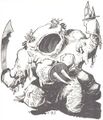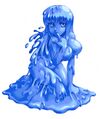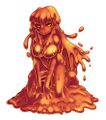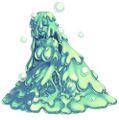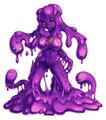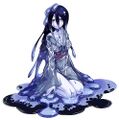Slime

"A slime draws near!"
- – Every Dragon Quest game ever
The Slime, also known as the Ooze, the Gel, the Jelly, or the Goo, is a humble form of monster that pops up in absolutely every frigging fantasy setting you can imagine, and even a few science-fiction settings. It is most famous in tabletop games for its many diffuse forms in Dungeons & Dragons and in videogames for Dragon Quest (in which it serves as the mascot and also has a fucking huge array of possible slime-forms), but, like we said, you can find a slime just about everywhere if you look.
Slimes are usually low to middle tier threat levels; they are mindless masses of animate sludge, and some higher-level variants may be made of elemental matter, such as water, "liquid ice", magma, molten steel, etc. They have no culture or higher purposes, they just ooze around eating anything organic they touch and growing bigger until they have to divide. Hardly likely to outwit most adventurers, but many games make them fairly resistant to certain kinds of attack, especially physical ones, so just assuming they're harmless is a good way to get dissolved. One prominent commenter described fighting a slime as "playing a terrifying game of 'guess the immunity'," referencing to the fact that unless you have your appropriate Monster Manuals memorised, you can rarely predict what will kill a slime variety outright. And guessing wrong can sometimes be worse than not trying, because using the wrong damage type can cause the slime in question to get stronger or divide into more slimes. And what they are or are not vulnerable to isn't always consistent between editions. A lot of them are also Gotcha Monsters because of their use of camouflage or near invisibility. This is often enforced by their slow speed that ensure an unsupported ooze can simply be fled from. Their lack of biological needs aside from hunger (solved by dropping scraps to them) means they are often used as part of mundane traps, like an ooze at the bottom of a pit trap.
Slimes in Dungeons and Dragons
Pre-3rd Edition
- Gelatinous Cube: Perhaps the most notorious slime to come out of the tabletop game field is the gelatinous cube, a D&D monstrosity that takes the form of a huge cube-shaped mass of near-translucent gray or green jelly, perfectly sized for oozing through the typical dungeon corridor as a living, insurmountable barrier. It was originally created by Gary Gygax as a joke, being the exact size of one grid square. Like the Rust Monster and Owlbear, it's one of those absurdities that everyone pokes fun at, but which has too much nostalgic fondness from the fanbase for anyone to seriously consider getting rid of it. Later, fortunately, it did come with a half-assed explanation: wizards breed them as living janitorial services to clean the garbage out of the perfectly-square corridors of their evil dungeons. As it's also mostly-transparent, save for the dissolving bits of armor floating in it like fruit in a jello dessert, walking straight into it only to be engulfed is an occupational hazard for dungeon-delvers. It has a paralyzing touch. Its weaknesses vary depending on the edition. Oh, and this thing is so (in)famous that it even showed up in a Disney film!
- Black Pudding / Deadly Puddings: Has nothing to do with the food called black pudding - this one has come to take Sam Tarly. Comes in other colors besides black, depending on what environment they are found in. All of the different colors are called Deadly Puddings. Can split if hit by weapons or lightning. Black puddings can dissolve organic material and metal. White puddings look identical to ice and snow and can instantly dissolve organic matter. Dun puddings live in deserts and can instantly dissolve leather, and can also eat metal. Brown puddings live in marshes and can instantly dissolve leather and wood. Stone puddings, grey puddings, and dense puddings all live underground. Stone puddings are slow moving and attack by dropping on prey from the ceiling, but can only dissolve flesh. Grey puddings can dissolve leather, wood, and metal, including magical armor, but they also are vulnerable to certain spells. Dense puddings are smarter than other puddings and infect people they attack with a debilitating disease, but are slower, not well camouflaged because of their blue color, and can only dissolve living flesh.
- Grey Ooze: Can rapidly corrode non magical metal similarly to a Rust Monster, but cannot dissolve stone. Is immune to cold and fire. Can camouflage itself as a puddle of water. In 5th edition they can sometimes develop the ability to use psychic attacks. Grey oozes are completely different in 4th edition. They have a foul smell that give an attack penalty and their acid attack can melt your bones.
- Green Slime: Green slimes are mostly immobile and are more similar to plants. Their only attack that they have is dropping on people who walk under them. Anybody who touches one will turn into one if they are not cured quickly. They are vulnerable only to fire, cold, and cure disease spells. They can eat through both metal and wood. The Green Slime returned in 4th edition but heavily changed. It is no longer immobile or able to infect people with a touch, but still prefers to surprise enemies by dropping on them. It is weak against fire and light. Green Slime returns again in 5th edition, but is now classified as a dungeon hazard instead of a monster and so doesn't have stats, though its traits are similar to how it behaved in early editions. It destroys metal and organic material on contact and can be destroyed by sunlight, anything that cures disease, or anything that does fire, cold, or radiant damage.
- Ochre Jelly: Similar to a black pudding but somewhat weaker. Only dissolves flesh. Can split if hit by weapons or lightning.
- Crystal Ooze: Native to the caverns of the Plane of Earth, these crystalline slimes usually subsist on the minerals found in rocks with the oldest being fuck hueg. While they're content to just leech what they need from their surroundings, Crystal Oozes will attack any living creature for the minerals in them and they're no push-overs either. Their slam attacks deal piercing and slashing damage and can crit on rolls of 18-20. They also give off a Subsonic Hum that can stun an opponent while the Ooze slithers over and engulfs them at their leisure. If the victim fails their Fortitude save, they become petrified and a new Crystal Ooze pops out in 1d4 hours. They're immune to the cold and electricity and resist fire; however, their bodies can shatter and split from bludgeoning and sonic attacks. Crystal oozes are completely different in second edition D&D. Instead, they are a variant of grey ooze that lives underwater and corrodes organic material, but not metal. Weapons can only deal 1 point of damage to a crystal oozes.
- Slithering Tracker: An intelligent slime that is nearly transparent. It paralyzes victims and slowly drains them of plasma. In 5e, they are said to be created from humanoids who willingly gave up their forms to get revenge on somebody they hated.
- Mustard Jelly: What happens when an idiot wizard tries to polymorph into an Ochre Jelly. It produces poisonous fumes that smell like mustard and slow down those who breathe them in. It is intelligent and can split in two at will, instead of splitting when hit with weapons. It cannot climb up walls or squeeze through tight spaces like ochre jellies can. It is immune to normal weapons, takes half damage from cold and the magic missile spell heals it, and it can eat through wood.
- Olive Slime: A plant like slime similar to the green slime, but even more dangerous. Like the green slime it is immobile and attacks by dropping on people that walk under it, and it produces a venom that causes numbness so the victim may not even notice the attack. It possesses the victims it infects and slowly eats them from the inside out, turning them into plant like zombies that melt into olive slime when they die, and can spread the infection. It is immune to everything except acid, fire, cold, and cure disease spells, and spells that affect plants. The zombies are the same except they are weak to magic missile instead of cure disease. If a olive slime meets a green slime then one of them will destroy the other.
- Stunjelly: Similar to a gelatinous cube. It disguises itself as a stone wall, although remains semi transparent. It has most of the same weaknesses as a gelatinous cube, except that cold affects it normally. First appeared in Fiend Factory as the Living Wall.
- Aballin: Also known as "living water", aballins are a type of slime that resembles a pool of stagnant water, strangely devoid of life and full of metals like coins and armor. Despite looking like water, Aballins are composed of a weak acid, which it uses to digest their victims after wrapping around their heads and drowning them (which means water breathing is pointless). Due to their semi-liquid bodies, they prefer to live in water but slither like slugs (up to a 30 degree slope). Unlike most other slimes, its roughly as smart as a wild animal and can learn to hunt its prey. Legend has it that the first was a druid polymorphed by an archwizard's curse. They are immune to fire, cold, and electricity, but are vulnerable to spells that affect water, and when they are pretending to be a pool of water they cannot be harmed by anything that wouldn't affect a pool of water. They also cannot be damaged by piercing and slashing weapons, and if you try there is a chance you will hit the person the aballin is trying to drown instead.
- Lava Ooze: An ooze made of lava. They are immune to fire and vulnerable to cold. In third edition, it consumes metal and stone, but cannot digest gems, which become stuck its body until it is killed.
- Ghaunadan: A shapechanger that serves the god Ghaunadaur whose true form resembles an ooze but also can transform into either a male human or a female Drow (So yes, this means that slimegirls are totally canon in D&D). In humanoid form they have a charming gaze and in ooze form their attacks cause paralysis. They are resistant to blunt weapons and while in ooze form can disarm enemies by trapping their weapons in its body.
- Flareater: A slime that likes to drop on prey from the ceiling. They are mobile unlike green slimes. While they can eat flesh, their favorite foods are light sources. They can increase their hitpoints by consuming both magical and non-magical light sources, and split when they reach enough hitpoints. They are immune to damage from light, heat, and fire, although long term sun exposure will kill them, and they are paralyzed by cold damage.
- Symbiotic Jelly: An intelligent slime that lives in a cave where it charms a carnivorous monster and uses illusions to make the monster appear as something less dangerous and add fake treasure to the cave to act as bait. When the monster it has charmed feeds on meat it somehow remotely feeds the slime as well. First appeared in Fiend Factory as the Chaoticus Symbioticus.
- Acid Blob: A smaller slime that moves by bouncing around and likes to hunt in packs. They can corrode metal.
- Alkilith: A Tanar'ri with the form of an ooze. They exist to spread corruption and pollution, and by infesting a door or a window they can transform it into a portal to the Abyss.
- Omshirim: A Mystaran slime that disguises itself as veins of precious metal. Created by Herathian mages by infusing a Lurker Above with quicksilver.
- Bloodsac: Blood- and brain-sucking blobs from Spelljammer that are camouflaged as part of the night sky and travel through space in packs.
- Plasmoid: Intelligent Slimefolk from Spelljammer. There are two subraces: DeGleash and DelNoric. They unexpectedly made a return in 5th edition as a playable race.
-
DeGleash
-
DelNoric
- Ontalak: A slime that disguises itself as a fully functioning spelljammer vessel.
- Mercurial Slime: Another from Spelljammer. "Sometimes" the starlight reflected off of it will mesmerize anyone looking at it like a hypnotic pattern spell.
- Silatic: Eats metal. Comes in three types: gold, platinum and iron. Each type eats the metal it's named after.
- Darklore: Slimes native to the Lower Planes that feed by sucking evil knowledge out of people's heads. They were created when a behemoth fleshcrafted by the yugoloths got dunked into the River Styx. The puddles that splashed upon the banks of the river became the first Darklores.
- Impersonator: A Ravenloft slime that can disguise itself as any one of its previous victims.
- Scamille: Identical to the mimic. Native to Mystara.
3rd/3.5 Edition
- Bone Ooze: A massive ooze that feeds by sucking people's bones out. Its insides are filled with sharp bone shards and they're stupidly deadly. They came back in 4th edition, renamed to bone collector, and classified as an undead ooze.
- Flesh Jelly: A blob of flesh covered in a layer of skin. It grows by absorbing living creatures. Touching one can infect you with a disease called filth fever. It also has an overwhelmingly foul smell.
- Reason Stealer: An unintelligent ooze with a craving for intelligence. When it delivers a killing blow it steal the victim's mind, gaining their stats, feats, skills, and prepared arcane spells for 24 hours, after which it becomes mindless again.
- Teratomorph: A reality warping slime. Although it is neutral aligned like most slimes it has a lot of chaotic abilities. Its touch can, at random, weaken your stats, polymorph you, make it stick to you, or, if you are really unlucky, instantly absorb you. It randomly opens portals to other planes in the area around it. It also warps the environment around it, making attacks and dexterity checks more difficult, and has a chance of hitting everything around it with two random spells. It has the ability to detect law. It is immune to chaotic spells, lightning, and acid. Weapons have a chance of completely missing due to the section of its body you are attacking suddenly shifting to another dimension before you hit it unless it is affect by a dimensional anchor.
- Arcane Ooze: Is immune to spells and can steal spells from arcane spellcasters to give themselves temporary hitpoints. Magical acid attacks heal them, and magical lightning attacks speed them up.
- Living Spell (Template): One of the newer additions to the family. Originating in Eberron's Mournlands, one of many results of the Day of Mourning, but since adapted to "generic" D&D. Living spell is a template that is applied to one or more spells instead of a creature to make a creature based on that spell or spells. It is always typed as an ooze. Enemies that are slammed or engulfed by the living spell are affected as though they were hit by the spell or spells it is based on. Living spells are also very resistant to magic. In 5th edition they are classified as constructs instead of oozes.
- Snowflake Ooze: A snow like ooze that live in cold climates and inflicts cold damage. It is immune to cold and vulnerable to fire, piercing attack have a chance of harmlessly passing through it, and bludgeoning attacks cause it to split.
- Summoning Ooze: A intelligent living summoning circle created by a summoning ritual gone wrong. It has the ability to cast summon monster spells. Immune to acid and fire.
- Bloodfire Ooze: An evil ooze made out of burning hot blood. It is created through ritually mixing the blood of 100 good or neutral humanoids with a demon's ichor. Is immune to fire and resistant to acid and electricity, and vulnerable to cold. It attacks with fire, and can empower fire spells cast within 60 feet of it.
- Corrupture: An amphibious ooze made of acidic liquid flesh that appears in areas where nature has been defiled by magic or pollution and attacks by spraying acid.
- Conflagration Ooze: An intelligent ooze that attacks with a poison that causes your insides to burst into flame. Is immune to fire and vulnerable to cold. Some of them also explode when they die.
- Graveyard Sludge: A slime made of necrotic energies and powered by the souls of the dead.When powerful necromancy is used around the dead, usually at graveyards during rituals or a Lich accending (though a really strong spell will do), the slime is formed and begins to hunt down any corpses to feed on the spiritual energy. The energy is used to defend itself but Liches like to use them as a means to bolster themselves. Graveyard Sludges can also cast 5th level or lower spells if they've fed on enough spellcasters. Their abilities are somewhat different in third edition. Creatures that die within 20 feet of graveyard sludge come back as zombies with an acid attack. They can cause fear, and strengthen undead creatures. They are immune to acid, and they are both alive and dead, so they are healed both by heal and inflict spells.
- Bloodbloater: A tiny aquatic ooze that drinks blood and attacks in swarms. Looks like an oversized cell. Because they are a swarm, they are immune to weapons and single target spells.
- Flotsam Ooze: An aquatic ooze with a very sticky body which collects debris.
- Reekmurk: A huge black aquatic ooze that lives in the depths of the ocean or in underground lakes. They can dissolve wood and have a powerful stench. They are immune to cold, but have a vulnerability to sunlight and spells that act like sunlight.
- Ethereal Ooze: An incorporeal ooze from the ethereal plane. It naturally forms into crystalline cuboid shapes instead of being just a blob.
- Bloodrot: Not actually a true slime, but is really a form of undead made from the remains of somebody who died by being completely dissolved in acid. Infects people with a magical disease called blood fever that causes the victim to melt into a puddle when they die which the blood rot eats. They can hide inside of the bloodstream of anyone who is infected with blood fever. They can also sense the location of anybody who is infected with blood fever within several miles, so if you escape from a battle with one but are infected then more will be attracted to you. Like many true oozes, it can split apart if hit by slashing or piercing damage. It came back again in 4th edition, now classified as an undead ooze, but lost its unique mechanics.
- Brine Ooze: An ooze that lives in deserts. It either hides in salt lakes or pretends to be a pool of water. It has the ability to rapidly desiccate whatever it slams into and is immune to desiccation itself. Slashing and piercing damage causes it to split.
- Cesspit Ooze: An ooze found in impoverished urban areas that feeds on fear and misery. They form spontaneously from the corpses of people who decayed in sewage or refuse in places near strong sources of magic. Its acid can dissolve organic and metallic materials but not stone. Those who are damaged by its acid may be driven into an uncontrollable rage. They have an overwhelming stink that sickens those that get too close to it. When they die, they explode and splatter acid around them. Slashing and piercing damage makes it split. They are immune to acid and resistant to electricity and fire, but have a weakness against positive energy similar to undead creatures. It is also more intelligent that other kinds of oozes, and are considered to be chaotic evil instead of neutral unlike other oozes.
- Sentry Ooze (Template): An ooze that has been modified with magic to make it stronger and more intelligent so it can act a guardian for a dungeon.
- Welp of Zargon: Those infected by Zargon's slime may transform into humanoid slime creatures. They deal acid damage and can also infect people with Zargon's slime. Creatures that get too close to one may be stunned by its horrific resemblance to its former self.
- Venom Ooze: A more dangerous glowing variant of the Ochre Jelly that was engineered by the drow. They are immune to cold, acid, and electricity, and have the ability to poison large bodies of water.
- Blood Amniote: Another monster made of blood. It is classified as an undead but has all the traits of an ooze. It is a huge mass of blood with the faces of people it has killed that makes people it touches expel their blood through their skin and it splits in two when it drains enough blood. They also came back in 4th edition as an undead ooze.
- Deathreap Ooze: An ooze from Ravenloft that inflicts necrotic damage and can create undead creatures by enveloping a corpse, which makes them useful to necromancers.
- Skitterhaunt: A parasitic ooze that infests and animates the corpses of giant bugs.
- Obsidian Ooze: A molten serpentine ooze that attacks smaller prey with sharp spines and drags them into its magmatic interior. Any attacks that hit it tend to melt weapons and spray lava all over their foes.
4th Edition
- Slime Devil: A devil specializing in interrogation that is also an ooze. It engulfs people and asks them questions, inflicting psychic damage if they lie.
- Abolethic Skum: Sometimes when an Aboleth enslaves someone, the process goes wrong and turns them into an ooze. Abolethic Skums are invisible while in water and have an aura that makes enemies vulnerable to psychic attacks. It is a minion type enemy so it dies in one hit.
- Spirit Ooze: An ooze formed from bits of insubstantial undead. They can hover and after hitting an enemy with their main attack become harder to damage and can shift by one square for one turn.
5th Edition
- Oblex: Has the ability to create exact copies of anyone it has eaten except for the cord of slime attaching the copies to the oblex.
- Dragon Blood Ooze: A ooze created by wizards experimenting with dragon body parts. In place of a dragon's breath weapon it can spray parts of itself on enemies.
Pathfinder
- Deathtrap Ooze: Reversing the ooze used as part of a trap gimmick, a deathtrap ooze is the trap. Able to transform into any trap with one or fewer moving part, a deathtrap ooze can pretend to be disabled and attack adventurers from the rear or attack the poor sap attempting to disable it outright, and that's assuming it's even found.
- Gunpowder Ooze: An ooze, made of gunpowder. Continuing the "guess the weakness" game above, it has vulnerability to fire but explodes and splits upon taking fire damage. It also coats people it attacks in gunpowder, making them liable to blowing up. The split and auto-combustion mean that this CR14 monster can be killed by nothing but two vials of alchemist fire creating a chain reaction of the split oozes blowing each other up. This means they're more living traps than anything.
- Hungry Flesh: An artifical ooze made of a huge pile of flesh. Thankfully they have very high nutritional needs (their own 3000 pound weight in food daily) so they'll quickly starve without support.
- Sapphire Ooze: A sapient, extraplanar, good aligned ooze that can talk?! This ooze can transform into living armor for a creature and buff things with saves against fear. Being the rare sapient ooze, they actually have a personality: Overeager adventure seekers that often get into trouble themselves.
- Carnivorous Blob: Have you ever wanted to run a campaign based on the 80s version of “The Blob”? Use this, and accept no substitutes!
- Sewer Blight: A low level ooze made of sewage that lives in the sewers under large cities.
- Slime Demon (Omox): A demon made of sewage that delights in desecrating bodies of water.
- Fell Flotsam: Undead ooze created when the spirits of dead creatures combine with the muck at the bottom of a swamp or river.
Slime Deities
- Juiblex: The demon lord of slimes and oozes.
- Ghaunadaur: The god of slimes and oozes, who may or may not be the same being as Juiblex.
- Zargon: An Elder Evil associated with slimes.
- Bwimb: The Archomental of ooze. Got killed by Tenebrous and replaced by his daughter Bwimb II.
Slimes in Dragon Quest
The slime is the mascot of the Dragon Quest video game series. Basic slimes are blue raindrop shaped creatures with cute faces. They come in a wide number of variants. One such variant are metal slimes, which give huge rewards for defeating them but are ridiculously difficult to beat due to their defensive abilities and tendency to run away before you can do any significant damage. Due to how iconic they are, TVTropes uses Metal Slime as the trope name for rare enemies in games that are tough to beat but give huge rewards. Not all slimes in the Dragon Quest are enemies. Good slimes usually introduce themselves by saying "I'm not a bad slime!"
Variants of this type of slime have been nigh-ubiquitous in various JRPGs for the last 30+ years. Given the small amount of separation between Japanese games and anime, it was only a matter of time before they became the focus of a series:
That Time I Got Reincarnated as a Slime
That Time I Got Reincarnated as a Slime is an Isekai light novel and anime, about a normal Japanese man who dies and ends up in the body of a slime in a world resembling the Dragon Quest games. Slimes in this world are normaly unintelligent and weak monsters, but this slime happens to have the most broken ability in the world: the ability to copy the skills and form of whatever they eat. They befriend a powerful dragon and become the chief of a Goblin village, which they expand into a new nation. It is actually surprisingly good by isekai standards.
Monstergirls
 | This article or section is about Monstergirls (or a monster that is frequently depicted as a Monstergirl), something that /tg/ widely considers to be the purest form of awesome. Expect PROMOTIONS! and /d/elight in equal measure, often with drawfaggotry or writefaggotry to match. |
Surprisingly, slimes have long been given the monstergirls treatment: Slime Girls (also known as Goo Girls) are typically not very smart, but very affectionate and horny, and their malleable gelatinous bodies have a lot of kinky shit they can do in the bedroom. In the more restrained versions a slime will engulf a guy while milking him dry, giving him a full body hug. This frequently results in cum floating around in the slime's body, often going towards a the slime's "heart", a core of a color that contrasts the body that is said to hold the slime's soul. It is often an erogenous zone because of course it is. In more extreme cases the slime will also penetrate the guy, engaging in stuff like sounding, or fucking him in the ass while he fucks her in the... well, everywhere is a hole for a Slime. There are also a few cases where vore starts to be involved, which would be a bit more true to nature for the slimes of D&D fame.
MGE Slimes
The Slime is one of the most profuse species in the Monster Girl Encyclopedia so far, second only to the Succubus family in terms of diverse members. The slimes of the MGE were heavily influenced by the slimes of the popular fantasy gaming series "Dragon Quest", with the Slime Queen and Slime Carrier in particular being derived from members of that series' vast array of slimes.
Your standard Slime in the MGE world is a dim-witted, happy-go-lucky aimless drifter that just squiggles around looking for a guy to sex. These stand out mostly via their blue coloration.
The Red Slime, in comparison, is smarter and more aggressive.
The green Bubble Slime has a unique chemical composition that causes her to constantly secrete bubbles of noxious-smelling gas. As a side-effect, she's no longer as sticky and cohesive as other slimes, making her grapples easier to escape. However, her substance is a powerful and addictive aphrodisiac, which eventually leaves her victim dependent upon regular ingestions of her drug-like mass. She was one of the first of the grimdark mamono.
The purple Dark Slime is an extremely powerful succubus/slime hybrid native to Demon Realms. The only slime-girl in the MGE with a core (thus far), they're also smart and predatory; they have the unique ability to corrupt human women, transforming them into new Dark Slimes, via a process that basically involves enveloping the women in their body, orgasmically digesting her alive, and then reforming her as a new slime.
Slime Queens are sometimes mistaken for normal slimes due to their being the same blue color. These slimes suffer a mutation that renders them incapable of physically dividing to reproduce like a normal slime; instead, they swell to massive proportions, and can manifest multiple slimegirl "bodies" from their central mass as they see fit, all of which are, of course, extensions of the slime's singular mind. The bigger she grows, the smarter she becomes. Kenkou Cross has asserted that there are actually Slime Queen variants for all of the standard slimes.
Sea Slimes are jellyfish-girls who live in the ocean, and so lack the shapeshifting prowess of their standard cousins.
Nureonagos are a Zipangu breed of slime whose name comes from a yokai that manifested as a soaking wet girl who comes wandering around on rainy nights. The Nureonago mamono is a slime with especially advanced mimicry abilities, allowing her to take the form of a solid human girl in clothes - but she can't deny her nature, and so always looks soaking wet.
Likewise, the Shoggoth is a slime-girl maid who specializes in shapeshifting, specifically in extruding pseudopods and shaping them into tools to help her do her various chores.
The Parasite Slime is a slime that can't take on a slime-girl form of its own, instead attacking human women and raping them until their mind breaks before using them as lures to attract human men to be their partners, turning them into the mindless fuck-puppets called "Slime Carriers". This is one of the two slimes that compete for the title of "most fucked-up mamono in the MGE".
The Humpty Egg is the other slime contender. See, in the region of the MGE world known as "Wonderland", there's a super-horny, busty and fluffy harpy species caled the Jubjub Bird. These harpies lay eggs, and if a man gets too close to an unhatched egg, there is a good chance that the unborn chick inside will become aware of his spiritual energies and react by bursting out of her shell as a horny loli slime-girl made of egg-guts, essentially aborting herself to have sex faster. Consisting of a loli made up of goopy, semi-solid egg-yolk and surrounded by a malleable mass of egg-white they use to form the traditional slime pseudopods. These slimes actually lay eggs when they get pregnant, which usually hatch into new Jubjubs, but are more likely than "normal" Jubjub eggs to turn into Humpty Eggs. This species was met with considerable outcry when it was released, with even many loli fans going "seriously, dude, this is going too far!" (Was this supposed to be Rule 34 of Sanrio's Gudetama? If it is then it may be even more sick. Poor Gudetama! He doesn't deserve this.)
Gallery
-
A normal slime.
-
A red slime.
-
A bubble slime.
-
A dark slime.
-
A Slime Queen.
-
A Shoggoth.
-
A Nurenago.










































